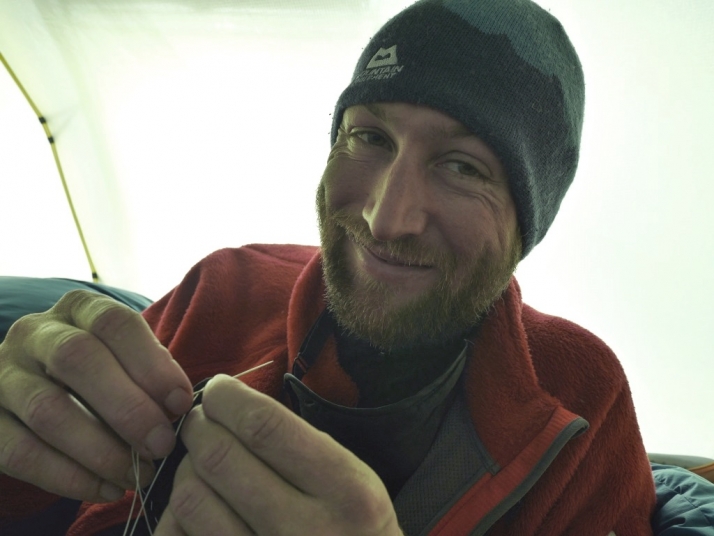Tracking
the Journey
-
Distance to go:
0 Mi
Distance
Ben and Tarka will cover 1800 miles starting from Scott's Terra Nova Hut at the edge of Antarctica to the South Pole and back to the coast again. That's equivalent to 69 back-to-back marathons hauling up to 200kg each (the weight of roughly two adult men) of kit and supplies necessary to survive.
Distances here are shown in statute miles.
Temporal Perception (yes a post from Tarka!) Day 51
Day 51: S86° 28' 47.34", S159° 36' 53.58"
Duration: 8 Hr 30 Min
Daily distance: 17.6 Mi
Distance to go: 1147.6 Mi
Temperature: -21 °C
Wind chill: -37 °C
Altitude: 9331 Ft

Following some gentle persuasion from the team I have agreed to relinquish my tools for the evening and take up the Ultrabook. A while ago there was a fascinating question by one of the contributors regarding how we perceive time (I apologise, I can't remember who brought up the subject in question). Along with their question they presented an interesting theory regarding the relative passage of time through various stages in our lives. I would be interested to know if this was just a theory or if there is data to support it.
In any case it got me thinking and I would like to share my experiences and thoughts on the subject. Please note that there is absolutely no scientific evidence to support the following theory, it is purely my speculation on the subject (incidentally if anybody does have any scientific data to support or contradict the following I would love to hear about it). Furthermore I possess neither the literary nor the creative linguistic skills that Ben has, so please lower your expectations considerably in relation to Ben's usual exceptional standard.
The reason this topic fascinated me so much was that there seems to be a discrepancy between how I perceive time to be passing in the present in contrast to that of a more prolonged period. Put simply, each individual hour of each day seems to pass at the same rate as it did on day one. Some of these hours seem to pass in a heartbeat whilst others seem to drag on indefinitely. This perceived variation however, depends almost entirely on how well I can drift away following a specific train of thought. As a general rule however, there seems to be no variation in my perception of these as the trip has progressed. My perception of the trip's previous days and weeks however, seems to be accelerating exponentially as I look at them retrospectively. My theory as to why this might be the case resides in a video compression analogy.
Video compression is so elegantly simple in its complexity but the basic premise being to reduce the amount of space needed to store a video whilst discarding as little of the original quality and detail as possible. Much like a hard drive on a computer I suspect our brain has a number of limitations, including storage space and speed of retrieval. There are hundreds (if not thousands) of digital video compression algorithms but for this analogy, crudely speaking each 'video frame' is analysed and compared to the neighbouring frames. If a part (or parts) of the frames being compared are found to be the sufficiently similar then it makes no sense to store the same information for every frame when it never actually changes. Instead it makes more sense to store the information only once and subsequently reference it as needed.
If the brain works in a similar manner this could help explain the perceived time dilation I am experiencing. During a given day information is fed into my short-term memory instantly, given that we are generally very good at remembering events in our short-term memory it stands to reason that only very minimal compression occurs here so events (and time) are stored in 'real time'. When I go to sleep that night however, the day's events are passed to my mid-term memory. During this process the brain analyses the day's events, determines that almost the entire day was identical (which they are) so compresses all the days repetition down to just isolate any unique events. This subsequently means that when I wake up, the previous day seems to be much shorter as the monotonous repetition that constitutes almost all our days has been condensed to just a few frames. At some arbitrary point in time, this entire day is committed to my long-term memory and the same process is repeated. Only this time the previously compressed day is analysed in relation to the other compressed days surrounding it and in exactly the same manner, the days are found to be near identical. Subsequently so entire weeks are compressed giving rise to this time perception distortion that I am experiencing.
In other news, today was cold and we walked into the endless horizon... again.










Comments
# Costa, December 15th 2013
it’s simple but paradox: boring times seem endless while you like wait for a bus, but they shrink to nothingness in memory (because nothing significant happened) - on the contrary while you’re doing something really exciting you won’t notice time going by, but… when you remember it, it seems to fill a lot of time.
kind of goes with your time compression theory, doesn’t it?
# Alessandra, December 15th 2013
In other news, today was cold and we walked into the endless horizon… again. :)
You’re the best.
# Sharyle , December 15th 2013
Good to hear from you, Tarka, at long last. Do you and Ben spend your evenings in deep philosophical discussions? Hmmmm…maybe not. Thanks for posting this fascinating idea. It’s amazing that we get to see a tiny bit of what you’re experiencing in Antarctica. Carry on to the white horizon!
# Harlan, December 15th 2013
Is all that we see or seem
But a dream within a dream?
Edgar Allan Poe
# Brendan Smith, December 15th 2013
He really is Mr. Spock!
Seriously, I think there’s a concept called “Flow” that says when you are very deeply concentrating on a subject and totally engaged, time seems to fly by. This is similar to an athlete who is “in the zone” and unstoppable in competition. However, when stuck in a boring or irritating situation (waiting in line at the motor vehicles bureau) time drags.
# Kristoffer, December 15th 2013
Tarka, the compression you are referring to is known as lossy compression, where some loss of original data is accepted in return for increased compression. There is also lossless compression, where no data is lost but the compression is not as great. Anyone who compresses files using a compression utility like 7-Zip is using lossless compression.
# Andrea, December 15th 2013
Very pleased to hear from you, Tarka! And a brilliant dissertation too, about time and time compression. I find particularly interesting the idea of different “processors” of memory, each one operating separately at separate stages in time, to store events at the best “signal to noise” ratio.
At the end, I think only events which have a strong contrast remain in memory.
And the “unexpected” events, too. If for instance you will come around a group of lost penguins tomorrow, that will be remembered forever! Anyway, thank you and best wishes for the rest of journey to you both.
# Kat, December 15th 2013
Hi Tarka, that was BEAUTIFULLY written…I really enjoyed seeing your mug and reading your philosophical thoughts on time. I hope you’ll write more.
Ben, it’s quiet on the comment boards sometimes, but we’re all still here, living our antarctic dreams vicariously through you. I wish there were voting buttons for these comments, because often I think, “YES! I agree!!”. I’m sure there are lots of us feeling this way!
Thanks again to both of you for sharing your photos, writings, experiences, boredom,misery and excitement with us.
Best Thoughts, for Best Results…
K
# Leigh Phillips , December 15th 2013
Wow.. Deep thoughts from the silent one! Loved the ending :-) i hope i can get to hear you both speak in the future.
# Tim Hall, December 15th 2013
You guys seriously need to get out more…! ;-)
# Janet Stanley, December 15th 2013
Good to hear from you Tarka, you & Ben stay safe :)
# Susan, December 15th 2013
Thank you for posting this! I am an English teacher, and I am designing a new lesson on the manipulation of time in writing. I will be using this Ted.Ed video: http://ed.ted.com/lessons/slowing-down-time-in-writing-film-aaron-sitze#review Your .post dovetails quite nicely with the ideas in this video. It is especially helpful that you also use a current film compression analogy that fits with Mr Sitze’s projector analogy.
This also comes full circle because I began exploring this lesson idea as part of a unit on adventure which was inspired, in part, by Ben’s Ted talk: Why bother leaving the house?